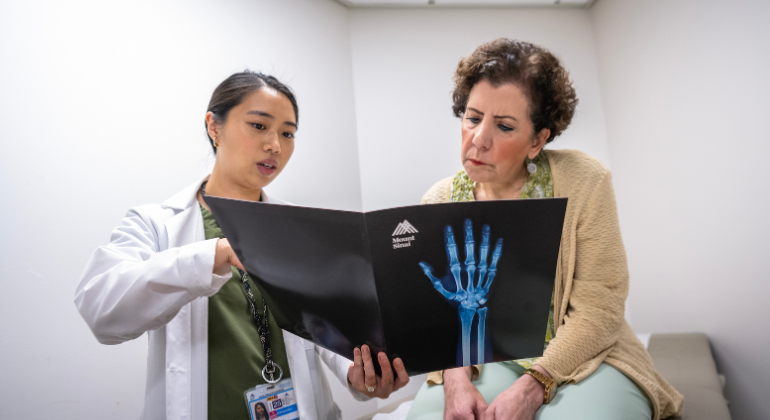Degenerative Changes Identified in Spinal Discs and Reversed With Drug Cocktail In Diabetic Mice
The study, led by James C. Iatridis, PhD, was published in the journal PLOS ONE on May 17.
Degenerative changes to the area of the spinal disc that absorbs most of shock felt with compression, known as the nucleus pulposus, has been demonstrated and reversed in a diabetic mouse model, according to a new study led by researchers at the Icahn School of Medicine at Mount Sinai. The study, published today in the journal PLOS ONE, reinforces the importance of diabetes in inducing degenerative changes to the vertebrae and intervertebral discs, and it is the first study to demonstrate that these changes can be slowed with oral drugs that inhibit both advanced glycation end products (AGEs) and inflammation.
AGEs are altered sugars that are formed by chemical reactions when foods are heated, pasteurized, dried, smoked, fried, or grilled and are often increased in western diets. When absorbed in high amounts AGEs can build up in the body, stick to tissues and oxidize them, causing inflammation.
"This is the first study to show that oral drugs may slow the natural history of diabetes-induced changes within the spine in animals, and we think that this approach holds promise in developing early effective treatments for the epidemics of diabetes and back pain," said the study's senior author, James C. Iatridis, PhD, Professor in the Leni and Peter W. May Department of Orthopaedics at the Icahn School of Medicine at Mount Sinai.
Low back pain and intervertebral disc problems accounted for 40.5 million in patient visits in 2005, high medical costs, and lost productivity. Diabetes is now at epidemic levels in the United States (26.5 million in the United States) and around the world (346 million).
In this study, researchers examined whether diabetes directly resulted in pathological changes to intervertebral discs and vertebrae of the lumbar spine, via accumulation of advanced glycation end products and increased inflammation. A second goal was to see whether a combination of oral anti-inflammatory drugs and blockers of advanced glycation end products could slow degenerative disc and vertebral changes.
The diabetic mice showed decreased trabecular bone, reduced disc height, and increased disc wedging, a sign of hyperlordosis. "What really surprised us is the effect on the nucleus pulposus, which had focal areas of loose disorganized tissue and cells," said Dr. Iatridis.
"AGEs accumulate in intervertebral discs as the body ages and contribute to a chronic inflammatory state in degenerated discs," said Svenja Illien-Jünger, PhD, the study's lead author, and postdoctoral fellow in the Iatridis Spine Laboratory in the Department of Orthopaedics at the Icahn School of Medicine. "Diabetes is a disease involving accelerated aging and degeneration." Dr. Illien-Jünger explained that the drugs used in the study are all approved by the FDA: pentosan polysulfate as an anti-inflammatory drug, pyridoxamine for the prevention of AGE formation, and enalapril, an AGE inhibitor and they expected an additive effect.
Researchers compared three groups of age-matched, middle-aged mice: non-diabetic, diabetic, and diabetic mice treated with pentosan polysulfate, pyridoxamine and enaprinil, an angiotensin converting enzyme inhibitor, which is standard treatment for diabetic patients with kidney disease. Mice ingested standard rodent food, known to be an abundant source of AGEs.
The study was funded by the National Institute of Arthritis and Musculoskeletal and Skin Disease of the National Institutes of Health and the Juvenile Diabetes Research Foundation. In addition to Dr. Iatridis and Dr. Illien-Jünger, other Mount Sinai investigators involved in the study include Gary E. Striker, MD, Professor, Geriatrics and Palliative Medicine; Helen Vlassara, MD, Professor, Experimental Diabetes and Aging; Damien M. Laudier, BS , Senior Associate Researcher; and Fabrizio Grosjean, MD, Assistant Professor, Nephrology at the Foundation Policlinico San Matteo IRCCS of Pavia, Italy.
About the Mount Sinai Health System
Mount Sinai Health System is one of the largest academic medical systems in the New York metro area, with 48,000 employees working across seven hospitals, more than 400 outpatient practices, more than 600 research and clinical labs, a school of nursing, and a leading school of medicine and graduate education. Mount Sinai advances health for all people, everywhere, by taking on the most complex health care challenges of our time—discovering and applying new scientific learning and knowledge; developing safer, more effective treatments; educating the next generation of medical leaders and innovators; and supporting local communities by delivering high-quality care to all who need it.
Through the integration of its hospitals, labs, and schools, Mount Sinai offers comprehensive health care solutions from birth through geriatrics, leveraging innovative approaches such as artificial intelligence and informatics while keeping patients’ medical and emotional needs at the center of all treatment. The Health System includes approximately 9,000 primary and specialty care physicians and 11 free-standing joint-venture centers throughout the five boroughs of New York City, Westchester, Long Island, and Florida. Hospitals within the System are consistently ranked by Newsweek’s® “The World’s Best Smart Hospitals, Best in State Hospitals, World Best Hospitals and Best Specialty Hospitals” and by U.S. News & World Report's® “Best Hospitals” and “Best Children’s Hospitals.” The Mount Sinai Hospital is on the U.S. News & World Report® “Best Hospitals” Honor Roll for 2024-2025.
For more information, visit https://www.mountsinai.org or find Mount Sinai on Facebook, Instagram, LinkedIn, X, and YouTube.

The Mount Sinai Hospital Ranked Among Top in the Nation by U.S. News & World Report®
Jul 29, 2025 View All Press Releases
Mount Sinai Implements Own the Bone® Program for Fragility Fracture Patients
Jul 08, 2025 View All Press Releases
Mount Sinai Health System Expands Care in Staten Island
Nov 04, 2024 View All Press Releases
Mount Sinai Health System and USTA Expand Exclusive Partnership Through 2026
Aug 15, 2023 View All Press Releases

